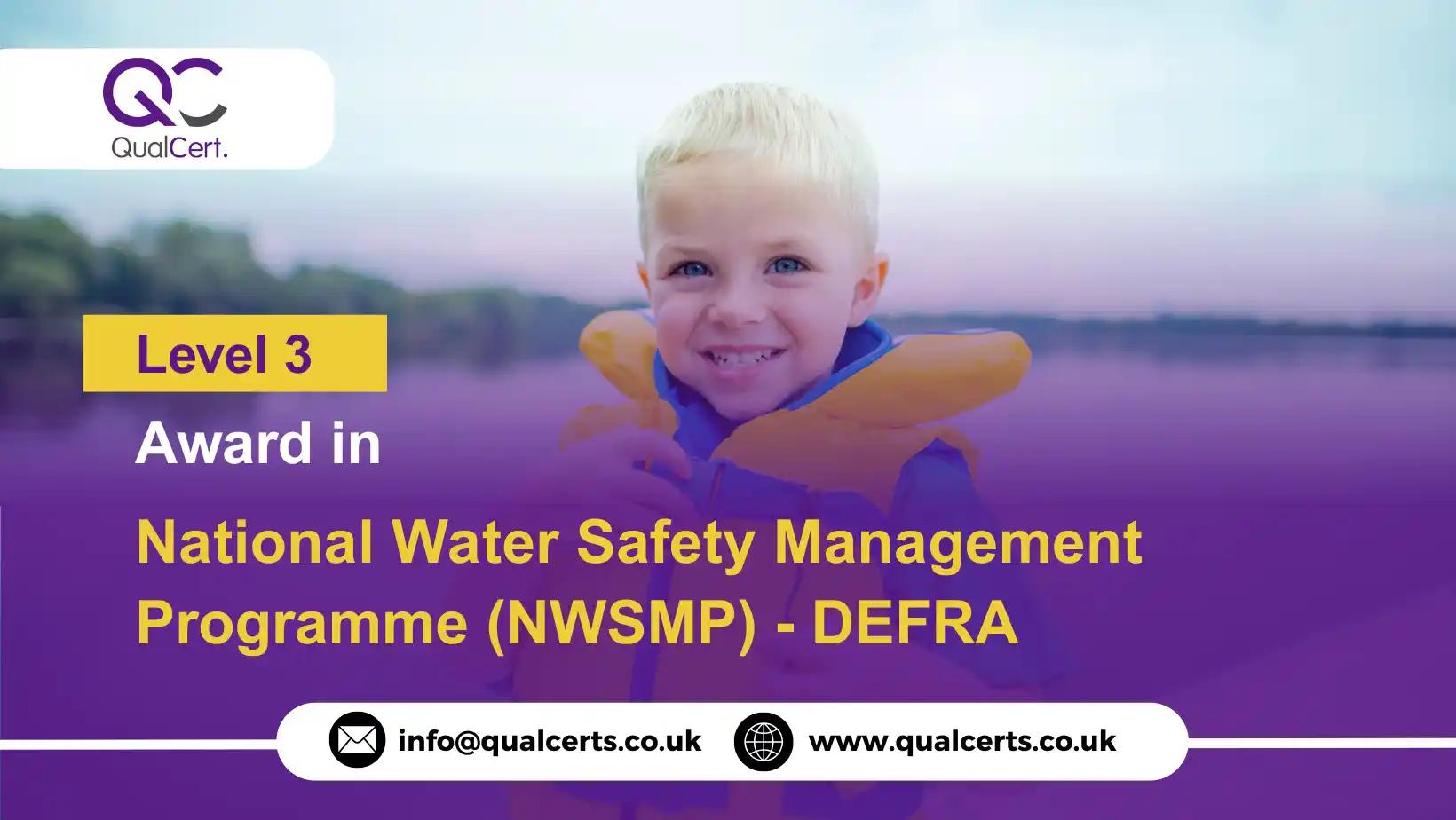The QualCert Level 3 Award in National Water Safety Management Programme (NWSMP) – DEFRA is a specialised qualification developed to support professionals responsible for managing water safety risks in both inland and coastal areas.
Endorsed by DEFRA (Department for Environment, Food & Rural Affairs), this award ensures participants gain the essential knowledge and skills to effectively reduce water-related hazards, promote safety, and respond confidently to emergencies in line with national standards.
The UK’s waterways, including rivers, lakes, reservoirs, canals, and coastal zones, present unique challenges and risks. Whether in environmental management, outdoor education, or public safety roles, understanding these risks and how to manage them proactively is paramount.
The NWSMP – DEFRA award addresses this need by equipping candidates with practical water safety management techniques and legal knowledge to safeguard both the public and personnel working near water.
The QualCert Level 3 Award in National Water Safety Management Programme (NWSMP) – DEFRA is a vital qualification for those responsible for water safety management across the UK. It provides a robust framework to minimise risk, protect lives, and ensure that all water-related activities are conducted safely and professionally.
Course Contents of QualCert Level 3 Award in National Water Safety Management Programme (NWSMP) – DEFRA:
The QualCert Level 3 Award in National Water Safety Management Programme (NWSMP) – DEFRA, offers 6 Credits, requiring a Total Qualification Time (TQT) of 30 hours, including 18 Guided Learning Hours (GLH).
| Unit Ref# | Unit Title | Credit | GLH | TQT |
| QC27002-1 | Introduction to Water Safety Principles | 1 | 3 | 5 |
| QC27002-2 | Recognising and Assessing Water-related Hazards | 1 | 3 | 5 |
| QC27002-3 | Planning and Preparing for Safe Activities Near Water | 1 | 3 | 5 |
| QC27002-4 | Incident Prevention and Emergency Response Strategies | 1 | 3 | 5 |
| QC27002-5 | Use of Non-specialist Rescue Equipment and Techniques | 1 | 3 | 5 |
| QC27002-6 | Legal, Ethical and Organisational Responsibilities in Water Safety | 1 | 3 | 5 |
Entry Requirements for the QualCert Level 3 Award in National Water Safety Management Programme (NWSMP) – DEFRA:
To enroll in the QualCert Level 3 Award in National Water Safety Management Programme (NWSMP) – DEFRA, following are requirement:
Minimum Age
- Participants must be 18 years or older to enrol in this course.
- This ensures maturity and responsibility for managing safety near water.
Educational Background
- There are no formal academic qualifications required.
- A basic level of education equivalent to GCSEs (or Level 2 qualifications) is recommended to support understanding of course materials.
Experience
- No prior professional experience in water safety or rescue is necessary.
- Basic water confidence and familiarity with outdoor environments is advantageous but not essential.
- Experience in supervisory or group leadership roles near water can be beneficial.
Language Proficiency
- Learners must have proficient English language skills to comprehend instruction, engage in discussions, and complete assessments effectively.
- A minimum of CEFR Level B1 or equivalent (such as IELTS 5.0) is recommended.
- Training providers may conduct language assessments prior to enrolment.
Learning Outcomes of QualCert Level 3 Award in National Water Safety Management Programme (NWSMP) – DEFRA:
Introduction to Water Safety Principles
- Understand the fundamental concepts of water safety and their importance
- Recognise the roles and responsibilities of individuals and organisations in water safety management
- Identify common water-related risks and the principles of accident prevention
Recognising and Assessing Water-related Hazards
- Identify various water hazards found in inland, coastal, and controlled environments
- Conduct effective hazard identification and dynamic risk assessments
- Evaluate environmental and situational factors that increase risk near water
Planning and Preparing for Safe Activities Near Water
- Develop comprehensive safety plans for activities involving water environments
- Implement control measures and supervision requirements appropriate to activity type and group
- Prepare emergency action plans tailored to specific water-related scenarios
Incident Prevention and Emergency Response Strategies
- Recognise early warning signs of potential water-related incidents
- Apply preventative measures to minimise risks during activities near water
- Demonstrate appropriate emergency response actions including alerting and assisting until help arrives
Use of Non-specialist Rescue Equipment and Techniques
- Demonstrate safe and effective use of basic rescue equipment such as throwlines and reach poles
- Apply non-contact rescue techniques suitable for untrained responders
- Understand personal safety considerations during rescue attempts
Legal, Ethical and Organisational Responsibilities in Water Safety
- Understand relevant legislation, codes of practice, and organisational policies relating to water safety
- Apply ethical decision-making in managing water safety and responding to incidents
- Recognise the importance of compliance with legal and organisational requirements to maintain safety standards
The Level 3 Award in National Water Safety Management Programme (NWSMP) is ideal for individuals who have responsibilities for managing safety near water environments but do not require full lifeguard qualifications. It is suited to those working in outdoor education, environmental management, and recreational sectors where water hazards exist.
This course is designed for:
- Outdoor activity leaders and instructors supervising groups near water
- Environmental and countryside officers managing waterway sites
- Teachers and school staff organising water-based field trips
- Local authority employees responsible for public safety in aquatic settings
- Volunteer group leaders and expedition supervisors involved in water activities
- Construction and utility workers operating close to water bodies
- Anyone tasked with planning and overseeing safe activities near rivers, lakes, canals, reservoirs, or coastal areas
Participants will gain essential knowledge and skills to assess risks, plan safe activities, and respond effectively to emergencies, ensuring safety for themselves and others in aquatic environments.environments.

